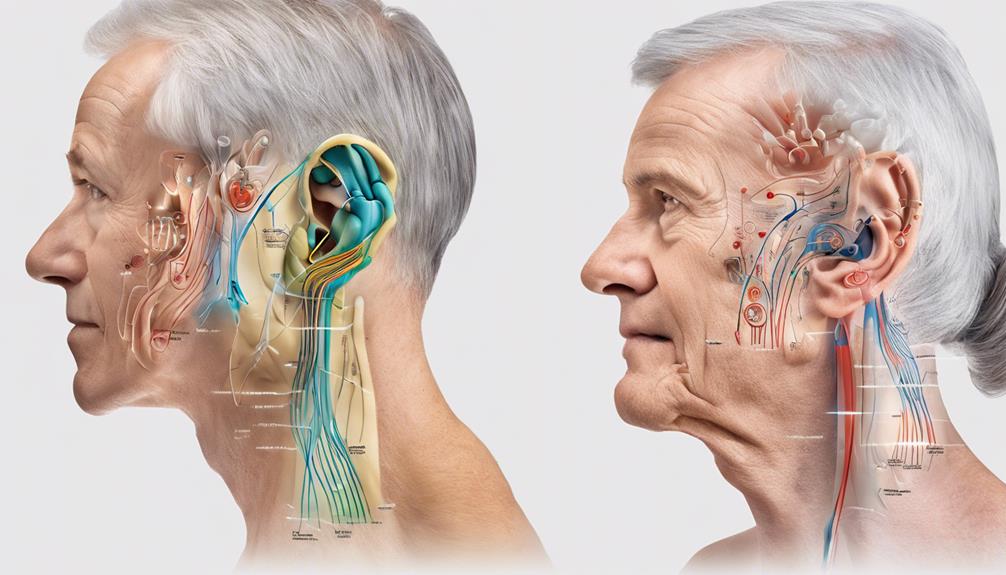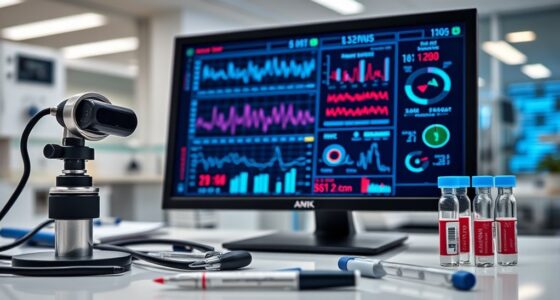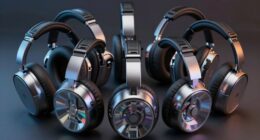In a thorough diagnosis, ENT specialists focus on identifying structural, medical, and surgical issues involving the ear, nose, throat, head, and neck, using advanced tools and procedures. Audiologists primarily assess hearing and balance, offering diagnostic tests and management strategies. Both professionals work together to provide holistic care—ENT handles physical conditions, while audiologists address auditory and vestibular concerns. Exploring how their collaboration improves diagnosis can give you deeper insight into ideal ear health management.
Key Takeaways
- ENT specialists diagnose structural, infectious, and complex conditions of the ear, nose, and throat using advanced imaging and surgical interventions.
- Audiologists focus on assessing hearing and balance functions through audiometric tests and manage related auditory issues.
- Both professionals collaborate for comprehensive diagnosis, combining medical and audiological insights to optimize patient care.
- ENT evaluation is essential for structural abnormalities, persistent infections, and surgical planning, while audiologists handle hearing loss and tinnitus.
- Integrated ENT and audiology services ensure holistic, personalized treatment plans with improved accuracy and reduced misdiagnoses.
The Scope of Practice for ENT Specialists
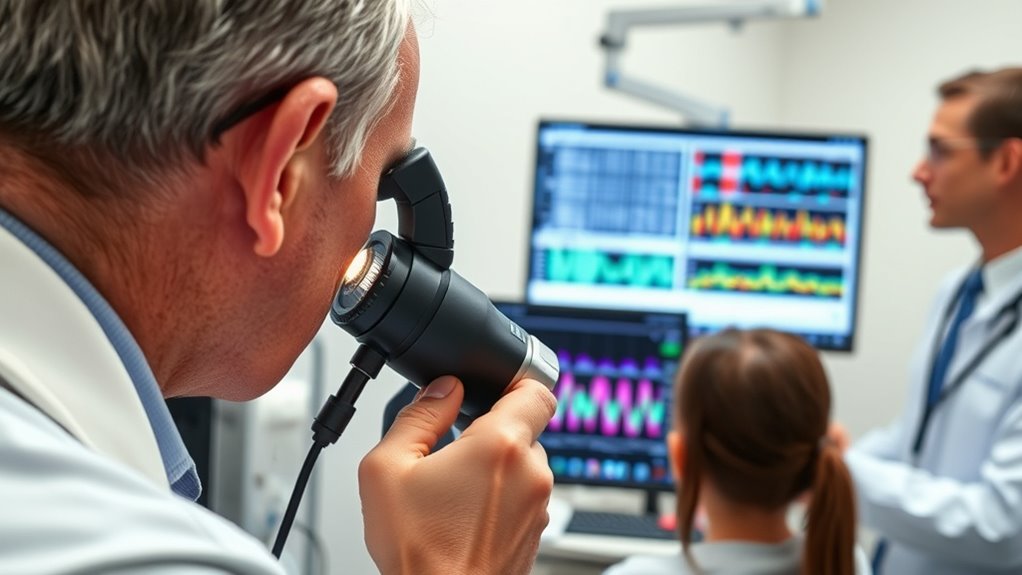
ENT specialists, also known as otolaryngologists, have a broad scope of practice that covers diagnosing and treating conditions related to the ear, nose, throat, and related structures of the head and neck. You rely on advanced ENT diagnostic tools to identify issues accurately, from endoscopes to imaging techniques. When necessary, ENT surgical interventions are performed to correct or remove problematic tissues, improve function, or address structural abnormalities. These procedures can range from minor outpatient surgeries to more complex operations. As a specialist, you are skilled in both diagnosing issues and providing definitive treatments, making your role vital in managing a wide array of ENT conditions. Your expertise ensures patients receive precise, effective care tailored to their specific needs. Additionally, understanding medical technology advancements allows ENT specialists to utilize the latest diagnostic and treatment modalities for improved patient outcomes.
Audiologists’ Role in Hearing and Balance Evaluation

While ENT specialists handle diagnosis and treatment of structural issues within the ear, nose, and throat, audiologists focus specifically on evaluating and managing hearing and balance functions. You play a vital role in this process by conducting detailed assessments to identify issues like hearing loss or balance disorders. Your responsibilities include:
Audiologists assess hearing and balance to support ear health alongside ENT specialists.
- Performing audiometric tests to determine hearing thresholds and speech understanding.
- Developing tinnitus management strategies to help patients cope with persistent ringing.
- Guiding vestibular rehabilitation to improve balance and reduce dizziness.
- Understanding the influence of projector technology on visual clarity, which parallels the importance of precise diagnostic tools in audiology.
Your expertise helps tailor treatment plans, ensuring patients regain their auditory and equilibrium health effectively. By focusing on these areas, you provide essential support alongside ENT specialists, emphasizing a thorough approach to ear health.
Collaborative Approach to Diagnosis and Treatment Planning

Effective diagnosis and treatment planning for hearing and balance issues rely on close collaboration between audiologists and ENT specialists. This interdisciplinary collaboration guarantees thorough, patient-centered care by combining expertise. You benefit from shared insights, faster diagnosis, and tailored treatment plans that address your unique needs. Joint efforts foster better communication, reducing misdiagnoses and improving outcomes. The table below highlights how collaboration enhances care:
| Role of Audiologist | Role of ENT | Shared Focus |
|---|---|---|
| Conducts detailed assessments | Performs medical examinations | Developing personalized plans |
| Identifies functional issues | Diagnoses underlying conditions | Ensuring holistic treatment |
| Monitors progress | Recommends surgical options | Improving patient outcomes |
This teamwork guarantees a well-rounded approach, ensuring you receive the most effective, patient-centered care possible. Holistic treatment supports comprehensive care by addressing all aspects of hearing and balance health.
When to Consult an ENT vs. an Audiologist

Deciding whether to see an ENT or an audiologist depends on your specific symptoms and their severity. If you have persistent ear infections, frequent dizziness, or suspect ear damage, an ENT is your best choice. They can diagnose and treat conditions like infections or evaluate candidacy for cochlear implants. Conversely, if you experience hearing loss, tinnitus, or require hearing assessments, an audiologist is the right specialist.
Consider these scenarios:
- You have recurring ear infections or suspect structural issues—see an ENT.
- You notice gradual hearing loss or need hearing aid fitting—consult an audiologist.
- You’re exploring cochlear implants—start with an ENT for evaluation.
Deciding promptly ensures you get the right care for your ear health.
Integrating Services for a Holistic Patient Care Experience
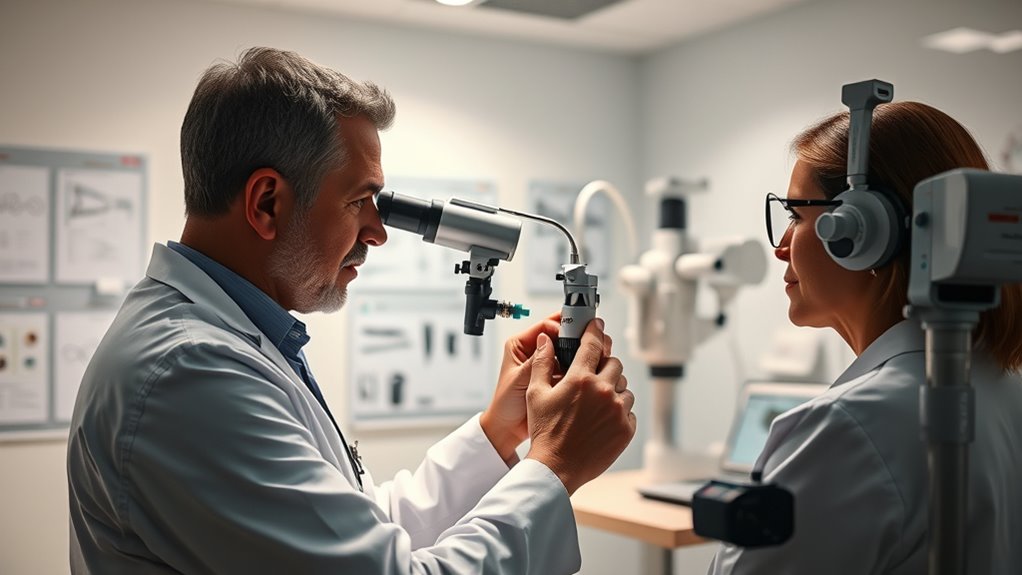
Integrating services between ENT specialists and audiologists creates a complete approach to patient care that addresses both diagnosis and management of ear-related conditions. This collaboration ensures a holistic assessment, considering all aspects of your health and well-being. By working together, they can develop a thorough treatment plan tailored to your needs, promoting patient-centered care. You benefit from coordinated evaluations that combine clinical insights with audiological expertise, leading to more accurate diagnoses and effective interventions. This integrated approach reduces the risk of misdiagnosis and delays in treatment, providing a seamless experience. Additionally, leveraging AI-driven solutions in healthcare can further enhance diagnostic accuracy and personalized treatment plans. Ultimately, combining ENT and audiology services enhances your overall care, ensuring every aspect of your ear health is thoroughly evaluated and managed for the best possible outcomes.
Frequently Asked Questions
Can ENT Specialists Diagnose Non-Hearing Related Ear Conditions?
Yes, ENT specialists can diagnose non-hearing related ear conditions. If you have ear infections, ear trauma, or other ear issues, an ENT doctor is trained to identify and treat these problems. They perform detailed examinations, including checking for infections, injuries, or abnormalities beyond just hearing loss. You should see an ENT if you experience pain, dizziness, or persistent ear issues, as they can provide extensive diagnosis and effective treatment.
How Do Audiologists Assist With Speech and Language Evaluations?
They say, “knowledge is power,” and audiologists empower you through speech and language evaluations. You’ll undergo a thorough language assessment to identify speech or communication issues. Audiologists work closely with speech therapy specialists to develop tailored strategies, helping you improve pronunciation, comprehension, or expressive language skills. Your active participation makes all the difference, ensuring you get the best support for effective communication and a better quality of life.
Are There Cases Where Both ENT and Audiologist Services Are Unnecessary?
You might wonder if both ENT and audiologist services are ever unnecessary. In some cases, you could face redundant testing or unnecessary consultations if initial assessments clearly indicate the diagnosis, and further testing wouldn’t change your treatment plan. It’s best to consult your healthcare provider to evaluate if additional evaluations are needed, avoiding unnecessary procedures and focusing on effective, targeted care.
What Advanced Technologies Do ENT Doctors Use for Diagnosis?
You might wonder what advanced technologies ENT doctors use for diagnosis. They rely on advanced imaging, like MRI and CT scans, to get detailed views of your ear, nose, and throat structures. Audiometric testing is also essential, helping measure your hearing ability accurately. These tools enable ENTs to identify complex issues that simpler exams might miss, ensuring precise diagnosis and effective treatment plans tailored to your needs.
How Do Interdisciplinary Teams Coordinate in Complex Auditory Cases?
In complex auditory cases, your interdisciplinary team collaborates closely to guarantee effective case management. You’ll share insights and medical data, making decisions collectively to tailor treatment plans. Regular communication keeps everyone updated on progress and challenges. This team approach leverages each professional’s expertise, ensuring thorough care. Your active participation in team collaboration helps optimize outcomes, addressing all aspects of the patient’s auditory health efficiently and effectively.
Conclusion
Understanding when to consult an ENT or an audiologist helps you get the best care. Recognize the scope of each professional, trust their expertise, and embrace their collaboration. By knowing who to turn to for diagnosis, evaluation, or treatment, you ensure thorough, effective, and personalized care. Together, ENT specialists and audiologists create a seamless experience—streamlining your journey to better hearing, better balance, and overall well-being. Your health benefits when you comprehend and utilize their combined expertise.



